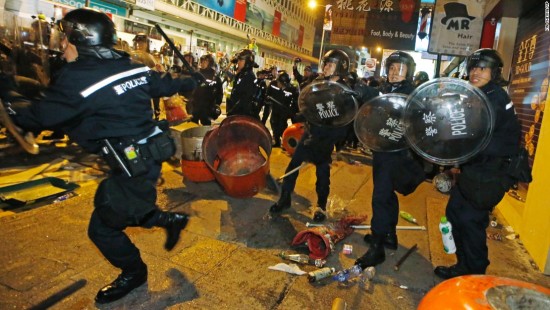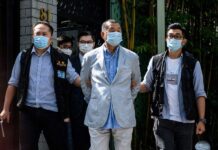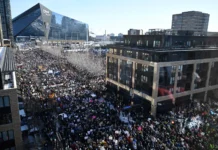Where do socialists stand?
Dikang, Socialist Action
The Mong Kok riot of 8-9 February marked a turning point in the territory’s political situation. Anger and frustration exploded during a Chinese New Year celebration against the hardline police methods that have become much more apparent since the mass protests of 2014, known as the Umbrella Revolution.
On the 28 February the legislative byelection in the New Territories East constituency took place and the political effects of the riot and the government’s repressive post-riot response left an unmistakable imprint on the result. In a statement, Socialist Action described the byelection result as a political earthquake. Edward Leung Tin-kei, the nativist candidate who was also arrested and accused of rioting, received 66,524 votes (over 15 percent) coming third. The government of CY Leung and the Hong Kong Police Force had unwittingly acted as the “election managers” for Leung.
While, as we explained, the outcome of the byelection would sound alarm bells all the way to Beijing, the result does not offer a way forward for the struggle against dictatorship and capitalism. This is because the anti-government mood was channelled behind a pro-compromise pan-democrat (who won the seat as expected with 160,880 votes) and the nativist candidate, whose programme offers a mix of right-wing ideas and muddled ‘radicalism’, but no viable strategy to challenge and defeat autocratic rule.
This article from the new issue of Socialist magazine (available from: [email protected]) explains the socialist view of the riots and the rise of nativism.
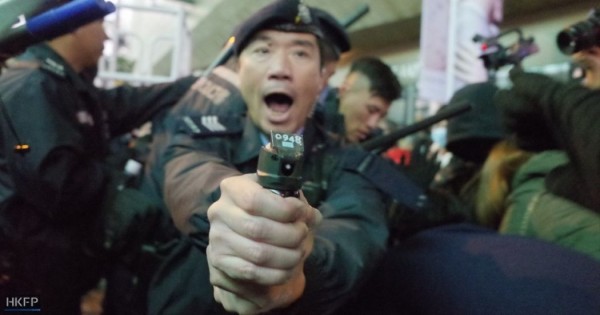
Who is responsible for the Mong Kok riots in February?
The mostly pro-government media has unleashed a torrent of propaganda since the riots, partly to blame nativist ‘black hands’ and partly to demonise all who oppose the government as supporters of violence. But it is clearly the government of CY Leung (and therefore ultimately Beijing) that bares the main responsibility for what happened. The government’s shift to more authoritarian measures, hardline policing, as well as its disastrous economic policies have created a political time bomb.
What is the attitude of socialists to rioting: can riots deliver change?
We reject the establishment hypocrisy: The Hong Kong pro-government camp defends one of the bloodiest and most violent regimes in the world. The same politicians cover up and refuse to condemn the massacre of over 1,000 young people and grassroots workers in Beijing in 1989. They support China’s brutal suppression of human rights in Tibet and Xinjiang.
Measured against these enormous and historic crimes, the violence in Mong Kok was minor. While we understand the anger and frustration of the youth in particular, which boiled over on New Year’s night, we do not support rioting. No government or system in history has ever been defeated or overthrown by riots.
To change the system you need to get organised and offer a real political alternative to the current dictatorial capitalist system. A riot doesn’t do that. It actually creates more problems because by its nature a riot is a blind explosion of rage without any plan or programme to challenge the government. Because it inevitably hits many ordinary citizens, small businesspeople and even poorer working class residents, a riot also gives the establishment an excuse to increase repression.
Is violence ever justified in a political struggle?
Socialists are not pacifists. But we completely oppose individualistic acts of violence such as terrorism, which split and harm the struggle for change. We emphasise the need for collective self-defence, organised through democratic channels, such as a trade union organising workers’ guards to protect a strike from company thugs or police.
In the mass Umbrella Movement of 2014, Socialist Action members campaigned for democratic grassroots committees to be set up in all the occupations, to take the running of the struggle out of the hands of the pan-democratic leaders who were steering the movement towards a dead-end. A key function of these democratic committees would be to organise defence of the occupations.
At that time we were opposed by the pan-democratic bureaucrats but also by the Hong Kong nativists. The nativists were only concerned with promoting themselves as the ‘opposition’ within the movement. But this nativist ‘opposition’ did not have the ambition to try to win the leadership of the movement from the pan-democratic politicians.
After the riots, a spokesman for Hong Kong Indigenous said: “We do not like to use force, but we are forced to do so because otherwise the government would not listen.” (South China Morning Post 21 February). But the problem is not to make the dictators listen – we cannot re-educate them through dialogue (that is the pan-democrats’ mistaken idea). The dictatorship needs to be driven from power – something only a mass movement with clear ideas can achieve.
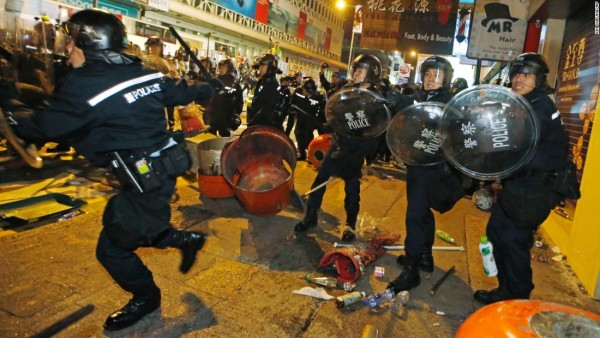
Which methods can win the struggle against a dictatorial regime?
We stand for the traditional struggle methods of the labour movement: democratic organisation, mass collective action, strikes including political strikes to demand a new government and real democratic rights, mass boycotts and non-payment campaigns – with these methods it would be possible to organise a movement of millions and win victories!
In South Korea, the military dictatorship was defeated in the 1980s by a mass strike movement – 1,060 new labour unions were formed and an incredible 3,500 strikes took place in the summer of 1987. The economy was paralysed and the dictatorship never recovered its control. The ‘Arab Spring’ of 2011 shows the other side of this reality. Because there was no working class political force to win the leadership of the revolutionary struggle, counter-revolution and new dictatorships have sprung up.
What is meant by revolution as opposed to reform?
A revolutionary alternative is not about throwing bricks, but about ideas, programme and methods. The ‘step-by-step reform’ road that the pan-democrats have pursued for 30 years has been shown as a complete failure.
Revolution is a much-maligned word (the pan-democrats were desperate to delete the word ‘revolution’ from the Umbrella struggle). But revolution means a change from one system to another achieved by the action of the masses. Socialists stress the need for a mass workers’ party with a programme to break the power of the tycoons and establish democratic public ownership and control over the economy, making possible both a democratic revolution and huge social improvements for the working class majority.


